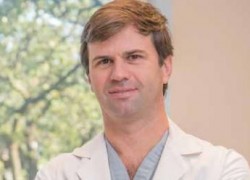Gabriel C. Tender, MD
Minimally Invasive Spinal Surgery
 Dr. Gabriel C. Tender, Louisiana State University’s director of minimally invasive spine service and associate professor of clinical neurosurgery, has always been impressed with the Neurosurgery Residency program at LSU School of Medicine, and he puts a great deal of faith in the physicians it yields.
Dr. Gabriel C. Tender, Louisiana State University’s director of minimally invasive spine service and associate professor of clinical neurosurgery, has always been impressed with the Neurosurgery Residency program at LSU School of Medicine, and he puts a great deal of faith in the physicians it yields.
“Our program here is very strong,” he says. “One of the greatest benefits of neurosurgery is the residents get to operate early and gain plenty of hands-on experience, which helps build confidence during the very first year. By the time they’re done, our residents are fully trained in all the procedures. If I don’t trust that my chief resident is trained enough to operate on me or my family by the time he or she finishes, then I have failed.”
The program’s strength is what originally attracted Dr. Tender to New Orleans. Originally from Romania, Dr. Tender came to the United States to complete his surgical internship at The University of Tennessee at Chattanooga before coming to New Orleans in 1999 to gain more clinical exposure and to complete his residency in the field. “I had no idea about the culture of the city,” Dr. Tender says. “I just came for the neuroscience program!” He wrapped up his residency and training right before Hurricane Katrina struck, and, after a brief relocation to Baton Rouge, he returned to New Orleans.
Dr. Tender performs minimally invasive complex spinal surgery, and he also treats neurological and spinal traumas. He says that treatment of spinal issues has seen an incredible amount of progress in the past 10 to 15 years in terms of technology and techniques. “Just 15 years ago, we were using techniques that we would today consider barbaric,” he says, citing open surgery that involved much larger incisions, muscle and tissue damage, heavy blood loss and lengthy recoveries.
Today, Dr. Tender’s minimally invasive surgical (MIS) techniques, sometimes marketed as “Band-Aid surgeries” provide for much quicker recovery, allowing for many patients to return home the next day or even the same day. Compared to open spine surgery, MIS uses computer-assisted technology and specialized tools to create tiny incisions only a few inches long to treat spinal issues.
“We offer the full gamut of minimally invasive surgery at LSU,” explains Dr. Tender, citing the TLIF technique for posterior spinal fusion, which he describes as the real “workhorse” when it comes to MIS spinal procedures; XLIF, which involves approaching the lumbar region through a small incision on the side; traditional screw placements; SI joint surgery for sacroiliac pain in the lower back and hips; and DTRAX cervical fusions. Dr. Tender says the majority of his patients are of “active age,” between 35 and 65, though MIS techniques are particularly helpful for the elderly, because of the low morbidity rates associated with it.
Though much of his practice is devoted to MIS spinal surgery, Dr. Tender is on call for neurotrauma two weeks out of the month, and he says his experience with elective MIS techniques makes him a more efficient trauma physician. “We learn a great deal from these procedures,” Dr. Tender says. “If a trauma patient comes to us with a shattered vertebra, instead of cracking open his abdomen, we can fix everything through a small, 3-inch incision in his back. The procedure is less risky and the patient’s recovery is much quicker than open spinal surgery, which could involve deflating a lung or removing several ribs.”
While he appreciates the simpler approach of MIS techniques, Dr. Tender realizes that no procedure is easy, but that is one of the aspects of his practice that he finds most rewarding. “We really love complex cases,” he says. “There is no boring day, because every case is different. The challenges we face to treat these unusual cases are what make life interesting!”
Medical School: University of Medicine and Pharmacy of Craiova; Craiova, Romania
Residency: Neurosurgery, Louisiana State University School of Medicine; New Orleans, LA
Internship: Spinal Surgery, University of Tennessee at Chattanooga; Chattanooga, Tennessee
Research Fellowship: Pain Inhibition, National Institutes of Health; Bethesda, Maryland
Board Certified: American Board of Neurological Surgery
3700 St. Charles Ave. 3rd Floor
New Orleans, LA 70115
(504) 412-1100
